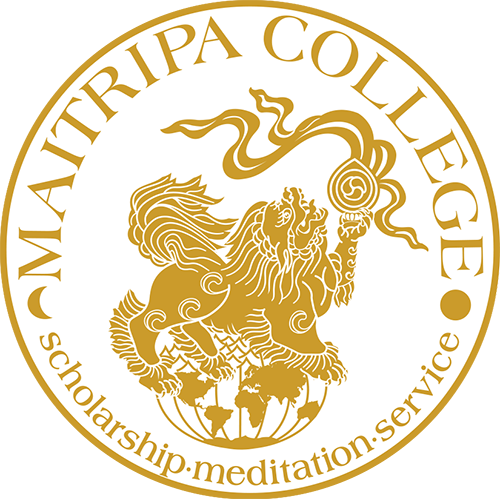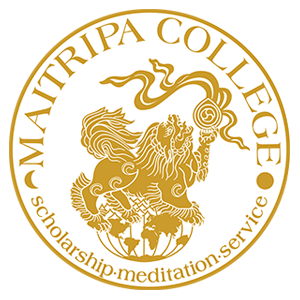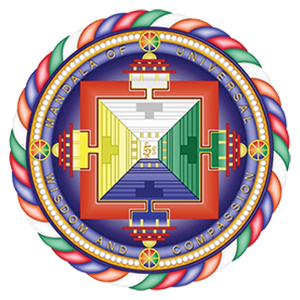Master of Arts in Buddhist Studies
(MA, 44 credits) Required Courses
Maitripa College faculty and staff are committed to periodic review and revision of this curriculum in light of new findings and methods in the fields of study, feedback from alumni and professionals, and faculty expertise. Maitripa College does not guarantee all courses will be offered as listed in the coming years. An individual student’s course of study will vary according to concentrations, language studies, pace of study, and elective options.
For more information, please see your academic advisor or contact us at education@maitripa.org To download a PDF version of the following information, click here.
SCHOLARSHIP PILLAR Course Groupings
Required: 6 courses (12 credits)
PHL301 Introduction to Buddhist Thought
PHL302 Foundations of Buddhist Thought: The Medium and Great Scope
PHL303 Madhyamaka Philosophy: Where is the Middle Way? or
PHL307 Madhyamaka Buddhist Philosophy: India to Tibet
PHL304 Madhayamaka Philosophy: A Dose of Emptiness or
PHL308 Mahamudra: Realizing the Nature of Mind
HIS301 History of Buddhist Thought in India and Tibet
PHL450 Theories and Methods in Buddhist Studies
Required: 2 courses (4 credits)
PHL404 Fundamentals of the Vajra Vehicle
THL410 Buddhist Rituals, Ethics, Services, and Ceremonies
THL320 Contemporary Buddhist Thought and Theology
THL305 Socially Engaged Buddhism or
Special topics on race, women, death and dying, etc.
MEDITATION PILLAR Course Group
Required: 4 courses (8 credits)
MDT301 Introduction to Buddhist Meditation
MDT302 Techniques of Buddhist Meditation: The Medium and Great Scope
MDT303 Techniques of Meditation: Madhyamaka or
MDT307 Madhyamaka Buddhist Meditation: Lineage of India into Tibet
MDT304 Madhyamaka Meditation: Preparation for Vajrayana or
MDT308 Techniques of Meditation: Mahamudra
SERVICE PILLAR Course Group
Required: 4 courses (8 credits)
CLICK HERE FOR MORE DESCRIPTION & DETAIL
CS301 Foundations of Buddhist Service
CS302 Finding Your voice: Communication and Context
CS303 Chaplaincy and Models of Spiritual Care
CS304 Servant Leadership in Buddhist/Spiritual Communities
FINAL MASTERY DEGREE REQUIREMENT
Required: 2 courses (4 credits)
ARP502 Action Research Project I
ARP504 Action Research Project II
OPTION TIBETAN TRACK: Classical Tibetan Language Course Group
Required: 2 courses (4 credits)
Graduate students in the Tibetan Track MA program are required to complete a minimum of four credits in Classical Tibetan language on-site at Maitripa College; the exact courses to meet the minimum may vary depending on prior study or availability of the student for summer enrollment. Students with interest in doctoral studies, translation, and practice and philosophic texts are encouraged to take as many credit hours as possible, with both Western and Tibetan teachers.
TIB101 Introduction to Classical Tibetan Language I (2 credits)
TIB102 Introduction to Classical Tibetan Language II (2 credits)
TIB108 Classical Tibetan Language Course Summer Intensive (4 credits)
TIB201 Intermediate Classical Tibetan Language I (2 credits)
TIB202 Intermediate Classical Tibetan Language II (2 credits)
TIB301r Seminar in Tibetan Translation (2 credits)
OPTION EDUCATION TRACK: Education Course Group
Required: two courses (4 credits)
Graduate students in the Education Track MA program are required to complete a minimum of four credits in Education on-site at Maitripa College. Key components of the curriculum include:
- Foundations of Buddhist Studies
- Foundations of Buddhist Meditation and Contemplative Practices
- Stages of Human Development: Learning, Teaching, and Faith
- Educational Theory and Practice
- Buddhist Ethics and Values
- Instructional Strategies and Models
- Curriculum Development
- Educational Leadership
- Research in Education
ED310 Stages of Human Development: Learning, Teaching, and Faith
GENERAL ELECTIVES and Curricular Planning
Students may select non-required courses from the course catalogue and new courses as they are offered to build specific competencies or concentrations of study according to their educational interests and goals. Students are advised to consider both breadth and depth of training, as well as requirements or expectations for post-graduate needs. The number of total electives is variable, and students are advised to generate an individual plan with their advisors.


